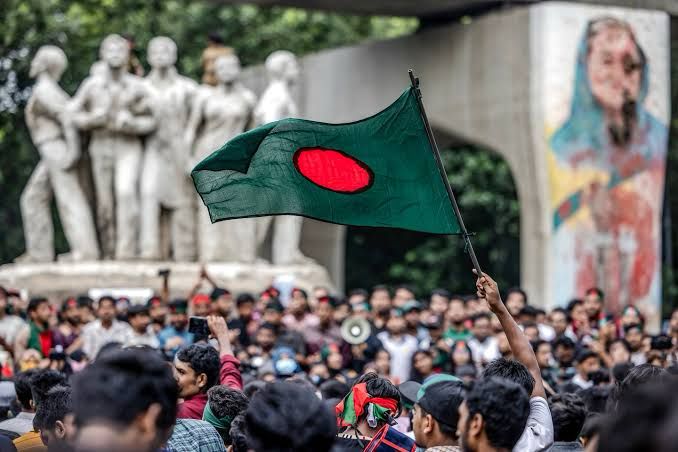The 2024 headlines made it clear to Bangladesh and the world that when a generation roars for a great cause—here, battling against the baton of an authoritarian government—they break the shackles of confinement. Now, as Bangladesh—deeply wounded—is in the process of restoring diplomacy and tranquillity to the lives of its 160 million citizens, we face a bigger question: was this truly a revolution or just an illusion?
Our society has a tendency to immortalise figures, often elevating them to mythic status. This is so prevalent in our region that we tend to forget that immortalising someone is the duty of time itself. We even exaggerate this immortalisation to another level, making a living, breathing figure immortal.
With that being said, as Bangladesh—who ousted its long-standing, 15-year autocratic ruler Sheikh Hasina in a student-mass-led uprising—is yet to recover from its post-revolution scenarios and lingering disorders, we are once again in the race to immortalise the fighters and valiant students of the “2024 July Revolution”, like Abu Sayed or Mugdho, who fought the baton and took the bullet for a greater cause than mere immortalisation. The 2024 uprising was not the result of a single individual’s heroism but an amalgamation of the power of unified action.
The quota system, which reserved a significant portion of government jobs for descendants of freedom fighters, was perceived by many as a barrier to merit and a symbol of inequality. The movement against it was not just about employment opportunities but a broader call for justice, transparency, and democratic governance. But this very tendency of immortalising—so prevalent right now—brings with it certain risks, diverting our focus from the issues that truly matter.
The country and its people should now focus on reconstructing and reshaping the ruined system from scratch: the judiciary, law enforcement, government bureaucracy, women’s and labour rights—the list goes on. However, that does not seem to be our current concern. Scrolling through social media, we see scandals involving many proponents of the quota movement—leaders judged based on their past lives. And now if you ask me, “Why are we not concerned about the facts that really matter?”
Once again, I ask, “What is that cause?”
In my eyes, if only the people knew whom we fought—was it Sheikh Hasina or fascism itself—then we could have shaped the country with all our utopian dreams. I remember when some of my classmates and I were cleaning the streets of Mirpur, Dhaka, on 6 August, just after Sheikh Hasina left the country, turning it into a ruined land of debris. We saw vans—many of them—of the Bangladesh Nationalist Party (BNP) pass by us, screaming slogans louder than “Bones”, as if they were the main characters. They forgot that it was with the blood of nearly 1,200 students and civilians that we were able to get rid of the rule of a fascist government. Yet, our main opposition party (BNP) couldn’t spend a single day commemorating their memory; instead, they jumped straight into throwing parties under the banner of the so-called “Celebration Rally”.
Now, you may say: that’s what political parties are supposed to do, right? Well, no, my dear friend. These political parties are supposed to be a reflection of the voices of thousands. The moment these parties realise that we vote for them not to rule but to run the country—then, and only then—might we expect the success of revolution.
Back in Grade 8, we had a text by Kazi Nazrul Islam, where he explored the spirit and post-revolution scenarios. Whenever there has been a shift through all-out movements—like the Sri Lankan Revolution—it’s the united effort that pushes people to go beyond and break the chains that held them captive for so long. When people wake up from their long slumber, like Kumbhakarna, the mythological figure from the Mahabharata who sleeps for six months straight, they unleash such power that it shakes the realm of long-standing beliefs and ideologies, shattering the rusty chains to pieces. But after a few days or weeks, most of them carry on with their day-to-day lives just like before, passing down the wand of control to another unworthy leader or ruler. In this whole process of waking up and fading away, they lose the “spirit” that helped them stand and speak out. And a whole generation loses its fantasies of a utopian land of eternal happiness.
In this very country—Bangladesh—back in the ’90s, people fought against the autocratic rule of Ershad and toppled the military regime, just like they did in 2024. However, the very party that came together to reform democracy in 1990—the Awami League—brutally killed that democracy just a few decades later. So, if this quota movement turns out the same way, what will happen is that our proud Gen Z will lose all their spirit, just like the millennials. As mentioned before, Nazrul termed this death of spirit as the death of a generation. Can we afford to lose ourselves to the abyss, just like the millennials?
If you ever feel like you’re losing the spirit of Gen Z, then recollect your July days—the surge of emotion blended with immense hatred that made you a man. How can we forget that our boys sacrificed and shed blood on the very roads where you are now thinking of quitting, handing everything over to Murphy’s Law of “What happens, happens”? Remember to answer the call that revives you.
Can we not hear that call?
















